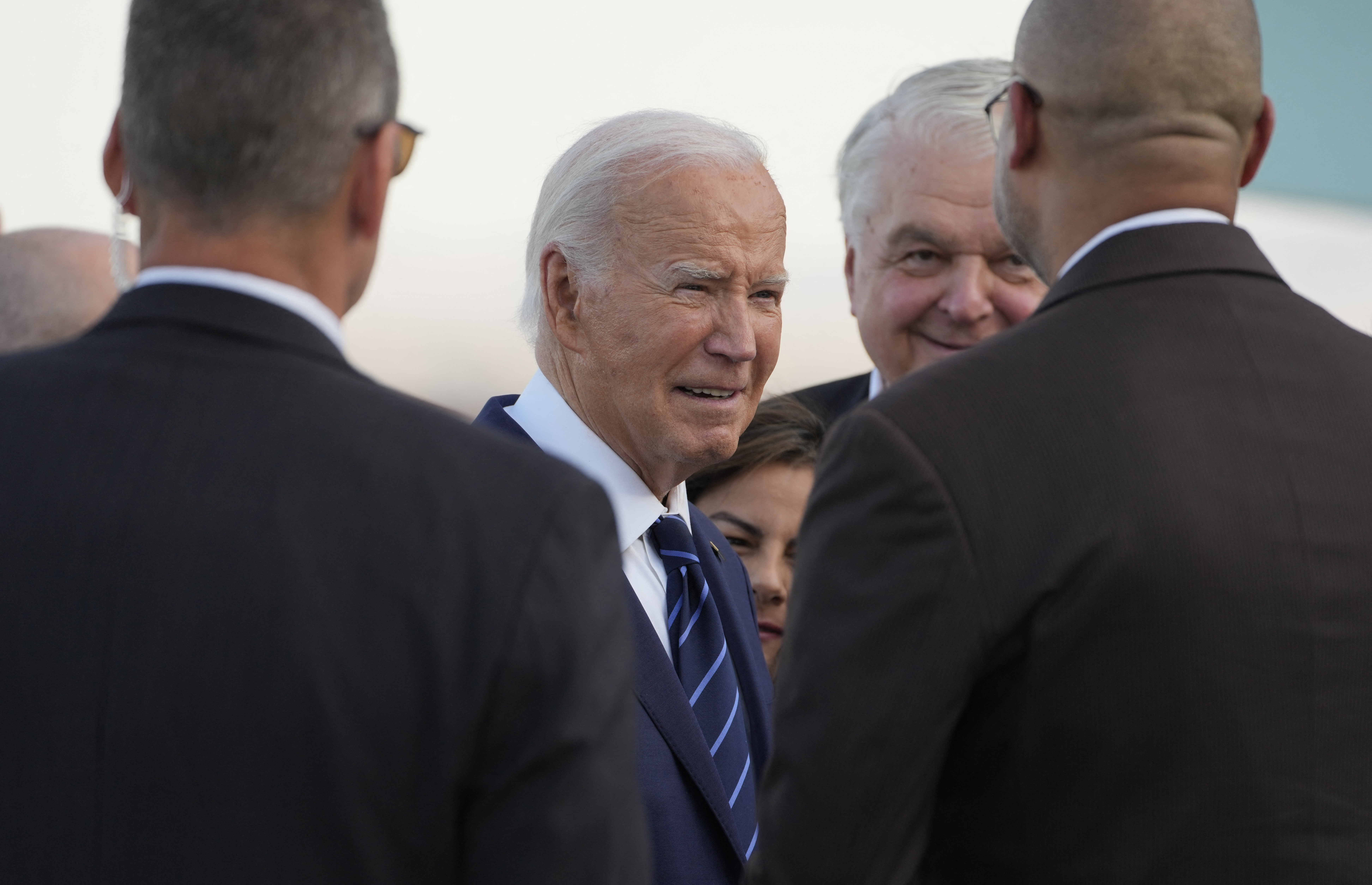
US President Joe Biden talks to greeters after stepping off Air Force One upon arrival at Harry Reid International Airport in Las Vegas, Nevada, on July 15, 2024. After cutting his vacation short and postponing a trip following the assassination attempt on former US President Donald Trump, President Biden is returning to semi-normal travel. Agence France-Presse
WASHINGTON — The assassination attempt on Donald Trump has forced Joe Biden’s campaign to dial down its attacks for now, with the US president admitting he was wrong to say his rival should be put in the “bullseye.”
But Biden has more broadly defended his rhetoric describing his Republican predecessor as a threat to democracy, and is signaling he will not hold back for long while criticizing the man he beat in 2020.
When Biden urged Americans to “lower the temperature” in a rare Oval Office speech on Sunday after the Trump shooting, it seemed it could deprive him of his core attack line.
READ: Biden says ‘bullseye’ comment on Trump was a ‘mistake’
Just last week the 81-year-old had tried to pivot his campaign back on to his Republican rival, following weeks of turmoil in the Democratic Party over his age and health after a disastrous debate performance.
In the light of the Trump attack, Biden told broadcaster NBC on Monday that was a “mistake” to say in a call with donors a week ago that it was “time to put Trump in the bullseye.”
The Democrat said he had meant that the party should “focus on what he’s doing” instead of calling him to quit after the debate.
READ: Biden defiant on campaign trail but pressure mounts
Republicans have pointed to the bullseye comment in particular as they accuse Biden himself of creating the political conditions that led a shooter to try to kill Trump — ignoring their own candidate’s history of encouraging violence.
But while Biden’s campaign has toned down its language in the immediate aftermath of the shooting, Biden himself hinted that he would not hold back.
“How do you talk about the threat to democracy, which is real, when a president says things like he says. Do you just not say anything because it may incite somebody?” he told NBC.
“I have not engaged in that rhetoric. Now my opponent has engaged in that rhetoric, he talks about how there’ll be a bloodbath when he loses.”
READ: Biden says he’s going to ‘complete the job’ despite calls to bow out
He also slammed Trump for pledging to pardon those involved in the January 6, 2021 Capitol attack by pro-Trump supporters and for joking about former US House speaker Nancy Pelosi’s husband being attacked with a hammer.
‘Changes the calculus’
Facing repeated questions over Biden’s comment at a White House briefing, Press Secretary Karine Jean-Pierre said it was “OK to speak to someone’s record, speak to someone’s character.”
Despite canceling a trip to Texas on Monday, Biden is continuing with a planned visit to the battleground state of Nevada, setting up a split-screen with Trump’s convention appearances.
In an opinion piece in the Washington Post, political columnist Karen Tumulty wrote that there could “hardly be a worse moment for Biden to be compelled to redraw his strategy against Trump.”
The Trump shooting could, however, help Biden as he fights for his own political survival.
“Obviously this changes the calculus for people calling for Biden to stand down,” Peter Loge, a political scientist at George Washington University, told AFP.
“It buys Biden some time.”
The Democratic meltdown over Biden’s age following the debate had dominated the airwaves for weeks, but with the gunshots on Saturday the revolt over his candidacy fell abruptly silent.
Biden has also sought to strike a presidential tone over the shooting, coming out quickly to react on Saturday and addressing the nation Sunday in just the third Oval Office speech of his presidency.
But if the shooting could unify Democrats, it could also doom Biden’s reelection bid, with the president already behind in most polls.
Iconic images of a bloodied Trump waving his fist after the shooting are already galvanizing Republican hopes that voters will further rally behind him for a landslide victory in November.
Loge, however said there may be little effect as “a lot of voters see Trump as too nuts and Biden as too old, and an assassination attempt doesn’t change that.”
He added that focusing on the immediate impact of the shooting on the campaigns was the “wrong question” and missed the wider need to tackle the threats and violence plaguing US politics.
“If we make political violence part of a campaign strategy we miss the point of political violence, and we end up kind of normalizing it,” he said.